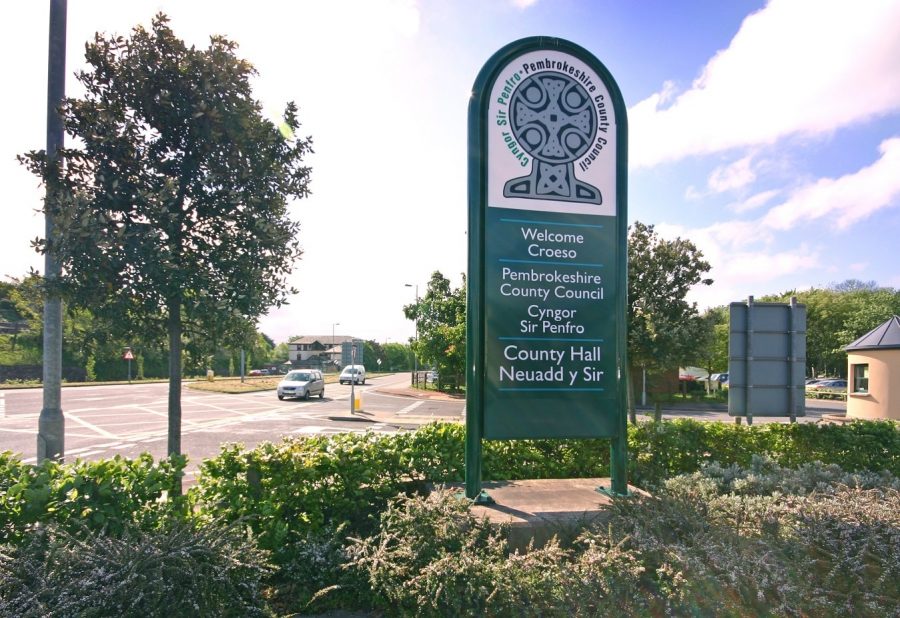Politics
Will buying the town centre help council regenerate Haverfordwest?

PEMBROKESHIRE COUNTY COUNCIL is looking to buy the Riverside Shopping Centre, Wilkinson’s store and Perrot’s Road car park in Haverfordwest, to support its ambitious regeneration programme for the town centre.
Cabinet approved the acquisition proposal on Monday (Nov 30) on condition that it is purchased is at less than market valuation
While that process is ongoing, Cllr Paul Miller has moved to explain the rationale behind it and discuss some of the issues which have been raised.
“I’m really pleased that this proposal has generated interest and I would like to try and answer for the public some of the questions which have come up so far. I’d also like to try and explain how our plans for the Riverside area fit within our wider Economic Development Plan for Pembrokeshire,” said Cllr Miller, Cabinet Member with Responsibility for Economic Development.
Sceptical about the plans, The Welsh Conservative Councillor group told The Pembrokeshire Herald: “While we support town centre regeneration, we have grave concerns regarding this decision by the Cabinet. We are still in a pandemic; the future of high street shopping is in the balance and this decision could have serious implications on Pembrokeshire’s tax payers. All councillors need more information on this project.
“The Councils focus should be on its core services; education and social services, and should leave owning shopping centres to specialist companies.”
Why is the council doing this?
“The Council has already developed a wide-reaching plan for the transformation of Haverfordwest.
“We’ve opened Glan-yr-Afon library and cultural centre, returning footfall to the town centre, we’re soon to start on site on Western Quayside – the former Ocky White building – creating an amazing food and beverage hub.
“We’re working on linking Bridge Street directly to the Castle and are committed to the wholesale redevelopment of the town’s unfit multi-storey car park.
“However, right in the middle of all those project sites, there is a fairly enormous space (in excess of 3 hectares) currently in the ownership of a single third party and that’s the Riverside Shopping Centre.
“Securing control of this site makes sense on a number of levels – not least because it enhances our ability to deliver on a whole-town plan. It also links directly to sites already in the Council’s ownership.”
If it goes ahead, how much will the acquisition cost?
“While negotiations are ongoing, and it should be stressed it may still not prove possible to agree a purchase price acceptable to both parties, I do not expect the Council’s contribution to the purchase price to exceed £700,000 including land tax charges. There are some maintenance liabilities we’ve identified which will be in addition to that sum.
“This level of capital funding is available from within the Council’s Property Investment Fund and so will not require additional borrowing. Nor will it directly impact on the Council’s revenue budget for other services or Council Tax levels.”
Risky, given the current economic climate?
“We’re going into this ‘eyes open’ to the worst case. Our worst-case scenario takes into account the current state of the market and the lease positions of the existing tenants.
“We know that more tenants will leave the centre over the next 12 months and we know things are going to get worse before they get better. Despite all that, our worst-case scenario still shows the centre to make a revenue surplus both in the particularly challenging short term and then to a greater extent in the medium term.
“The financial effect of the short term challenges are included in the modelling and actually the purchase price reflects that fact too. In addition, we anticipate further vacancies in the short term might actually be desirable, making easier some of the physical changes to the site that will inevitably be required.”
Isn’t there a risk this all goes wrong?
“There is always that risk. It’s no different to the risk associated with running our current industrial estate units. If all the tenants suddenly disappear, you’re left with no income to use to maintain the site.
“In this case, we’re very aware of the risks. We’re aware of the wider market position, of the businesses under pressure and aware of the number of leases expiring in the coming years.
“The Council’s officers and advisors put together three scenarios for cabinet to consider. A Best, Worst and Reasonable case. We focused our thinking around the worst-case model and that has driven our thinking on purchase price and determined our appetite for this at all.
“That worst-case scenario still shows the centre to make a revenue surplus both in the particularly challenging short term and then to a greater extent in the medium term.”
Is retail a dead duck?
“I accept completely that there is no future in retail-only town centres. We are not purchasing the Riverside because we think we’ve spotted something no one else has and that suddenly there is going to be some town centre shopping renaissance.
“We do however think our town centres have a future, just a different future. The Grimsey Review (just one example of the many such reviews into town centres) is clear both on the need for local leadership and public sector investment in transforming town centres. The review also has as one of its key findings the following; ‘There is a need for all towns to develop plans that are business-like and focused on transforming the place into a complete community hub incorporating health, housing, arts, education, entertainment, leisure, business/office space, as well as some shops, while developing a unique selling proposition (USP)’.
“That’s exactly what this purchase is about. It allows us to support a whole town plan for transformation not to ensure Haverfordwest continues to provide what people used to want but to ensure Haverfordwest provides what people want know and what people will want in the future.”
Aren’t they interfering in the role of the private sector?
“We know that the private sector is not going to repurpose our town centres for us. We also know how the Riverside has fared over the years in remote ownership. In my view we have a choice. We either say we don’t care about the town centre and it’s for the private sector to sort out, or, we recognise the role which a quality built environment plays in the wider offer of the County – and in turn how that supports economic activity.
“What I want to ensure is that we provide the local leadership and vision needed to see a transformation happen in Haverfordwest. We don’t think for a second we can bring about that transformation on our own but we do, absolutely, have a key role to play. In this case, that role is in securing the asset upon which future regeneration interventions will be built.”
Will the Council be managing the centre?
“The authority will not be directly managing the asset either in the short or the long term. This will be done by others and the costs of that management has been included in all of our modelling. To repeat, even our worst case model shows the site always making more income than it costs to run.”
Why should the Council get involved?
“To start with, because no one else is going to. I believe, strongly, that the quality of key town centres is important for the wider economic wellbeing of Pembrokeshire. We could, of course, just look the other way and say this is something for the private sector but I believe to do so would be a mistake.
“I do not believe that the local authority can transform Haverfordwest Town Centre on its own.
“However, I do believe we have a clear role to play in support and through the strategic acquisition proposed we can make that transformation deliverable.
“Beyond the strategic acquisition we are already in discussion with prospective private sector development partners and we anticipate taking those discussions forward with more vigour if the sale is completed.
“We don’t have a dream of doing this all on our own – but we know we have to play our part if we’re to deliver.”
Community
Cilgerran Church in Wales school petition to be heard

A PETITION opposing proposed changes for a north Pembrokeshire school is to be heard by councillors later this week.
At last May’s meeting, Pembrokeshire County Council considered a report of the School Modernisation Working Group which outlined the findings of a review of education provision in the Preseli area.
A later July meeting backed a general consultation to discontinue Cilgerran Church in Wales Voluntary Controlled School, and to establish it as a 3-11 community school.
“In particular, the review considered the extent of surplus school places in the area, set against a significant decline in the pupil population,” the council in its consultation has said.
The consultation closed on January 30.
Hundreds have opposed the proposed changes, with a petition, on the council’s own website opposing the changes recently closing after gaining 391 signatures.
Any petition of more than 100 signatures triggers a debate at one of the council’s scrutiny committees, in the case of Cilgerran that debate taking place at Pembrokeshire County Council’s February 5 schools and learning overview and scrutiny committee.
The Cilgerran e-petition, created by Louise Williams, raised concerns including the school could become part of a federation, a loss of permanent head teacher on site, a shared head teacher would have to oversee several schools, loss of funding control and the ability to maintain the school’s current healthy and stable funding, and a loss of commitment to the church, in turn could impact on the school’s and pupils values, beliefs and cultural beliefs.
It said: “Ysgol Cilgerran VC school has strong links with the Church community in Cilgerran and we believe this will have a negative impact on the children who attend the school, the community of Cilgerran and the links between the two.
“We are proud of our school ethos and values which are strengthened by our links with the church. The school has close and strong relationships with our Church in Wales federation governors one of which is also our safeguarding governor.
“Our Church Federation governors work closely with the school and are regular visitors to the school and the children. They provide vital support and guidance to the school and have a positive impact on the Children’s education. We believe these links will be weakened by this proposal to remove our VC status and we believe this is an un-necessary action.”
The proposals for Cilgerran are part of a wide range of potential education changes in the county.
Two petitions, opposing the potential closures of Manorbier and Ysgol Clydau schools, were recently heard at full council and a further petition opposing the potential closure of Stepaside School has recently been launched, which has generated enough support to be heard at a future council meeting.
Crime
Welsh Lib Dems urge ministers to rethink rates relief for struggling pubs and cafés

Calls grow for Welsh Government to match support offered to English venues
THE WELSH LIBERAL DEMOCRATS have urged the Welsh Government to review its business rates policy, warning that scaling back support for pubs and hospitality risks further closures across towns and villages.
Party leader Jane Dodds, who represents Mid and West Wales in the Senedd Cymru, said ministers should act quickly to protect local venues after additional support for pubs and music venues was announced for England by the UK Government.
The measures announced by the Chancellor do not automatically apply in Wales, leaving uncertainty over whether similar help will be introduced here.
Hospitality businesses across Pembrokeshire and Carmarthenshire have already reported rising energy bills, higher wage costs and reduced footfall since the pandemic. From April, current business rates relief is expected to be reduced, a move the Liberal Democrats say could place Welsh firms at a disadvantage compared with competitors over the border.
Dodds said that pubs, cafés and restaurants form “the heart of our communities” and warned that withdrawing relief now would be “a serious mistake”.
She told the Senedd that support “cannot stop at pubs alone” and should extend to the wider hospitality sector, including restaurants and family venues that rely heavily on seasonal trade and tourism.
“When questioned, the First Minister said she needed to examine the details of the English package before committing to anything similar for Wales,” Dodds said. “Without urgent action, we risk losing viable, well-loved businesses that communities simply cannot afford to lose.”
The party is also calling for UK-wide action, including a temporary reduction in VAT for hospitality and tourism, funded by a windfall tax on large banks.
However, Welsh Government sources have previously argued that decisions on rates relief must be balanced against pressures on public finances, with ministers required to prioritise health, education and other frontline services within a fixed budget. They have said any additional support would need to be affordable and targeted.
Industry bodies have echoed concerns about the challenges facing the sector. Trade groups say many independent pubs and cafés continue to operate on tight margins, particularly in rural areas where they serve as community hubs as well as businesses.
Local operators say clarity is now key, with decisions on staffing, stock and opening hours often planned months in advance.
With the next financial year approaching, hospitality owners will be watching closely to see whether Wales mirrors England’s support – or leaves businesses to absorb the extra costs alone.
international news
Mandelson quits Labour over Epstein controversy

Former cabinet minister says stepping down is ‘in best interests of the party’ as questions raised over historic payments
LORD MANDLESON has resigned his membership of the Labour Party, saying he does not want to cause “further embarrassment” following renewed controversy over his past links to convicted sex offender Jeffrey Epstein.
The former cabinet minister and one-time UK ambassador to the United States confirmed his decision in a letter to Labour’s general secretary after fresh documents released by the US Department of Justice appeared to reference him in connection with Epstein’s finances.
The files suggest that three payments of $25,000 — totalling $75,000, about £55,000 at today’s exchange rates — were allegedly made to Peter Mandelson in 2003 and 2004.
Lord Mandelson said he had “no record or recollection” of the transactions and believes the allegations may be false, but intends to investigate the matter himself.
In his resignation letter, he wrote that he felt “regretful and sorry” to be linked again to what he described as the “understandable furore” surrounding Epstein.
He added that stepping down from party membership was the responsible course of action while he reviewed the claims.
“I do not wish to cause further embarrassment to the Labour Party,” he said. “I have dedicated my life to the values and success of the party and believe I am acting in its best interests.”
Ambassador role ended
Lord Mandelson had been appointed the UK’s ambassador to Washington by Prime Minister Keir Starmer in December 2024.
However, he was removed from the post last year after earlier revelations about his past friendship and contact with Epstein, including emails showing communication after the financier’s 2008 conviction.
The latest release of files has also included photographs said to show Lord Mandelson alongside an unidentified woman. He said he could not place the location or circumstances of the images.
There is no suggestion that appearing in the documents or photographs indicates criminal wrongdoing.
‘Deep regret’
Earlier this weekend, Lord Mandelson reiterated his regret for ever having known Epstein and apologised “unequivocally” to the women and girls who suffered abuse.
“I want to repeat my apology to the women and girls whose voices should have been heard long before now,” he said.
Epstein died in prison in 2019 while awaiting trial on sex trafficking charges, but investigations into his network of associates continue to generate political fallout on both sides of the Atlantic.
Labour has not yet issued a detailed statement beyond confirming it had received Lord Mandelson’s resignation.

-

 Health5 days ago
Health5 days agoConsultation reveals lack of public trust in health board
-

 News6 days ago
News6 days agoCaldey still unsafe, survivors warn — despite Abbey’s reform claims
-

 Community6 days ago
Community6 days agoPembrokeshire students speak at national Holocaust Memorial Day event
-

 News6 days ago
News6 days agoKurtz raises Gumfreston flooding in the Senedd as petition deadline nears
-

 Community7 days ago
Community7 days agoStorm Chandra: Morning impacts across Pembrokeshire
-

 Entertainment7 days ago
Entertainment7 days agoRapunzel brings festive magic to Torch Theatre
-

 Crime7 days ago
Crime7 days agoMan denies murdering brother as jury hears of ‘ferocious attack’ at Morriston flat
-

 Crime4 days ago
Crime4 days agoPembroke man accused of child sex offences sent to Swansea Crown Court



























